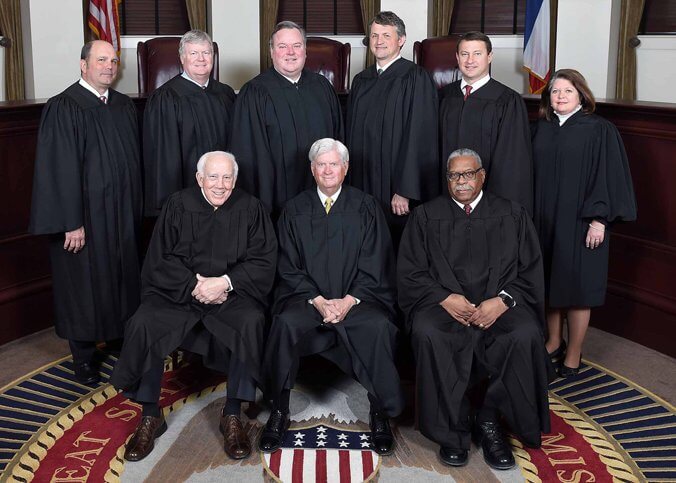

State of Mississippi Judiciary
Mississippi Supreme Court
The Mississippi Supreme Court will be the tiebreaker in a dispute between members of the Legislature and Gov. Tate Reeves on whether the governor’s partial veto of a bill providing funds to health care providers to combat COVID-19 was constitutional.
Before breaking that all-important tie, it might behoove the Supreme Court justices to gather all the facts — facts they did not seem to have during last week’s oral arguments.
Mississippi’s 1890 Constitution gives the governor partial veto authority, but court rulings through the years have dramatically limited that authority. When Reeves partially vetoed the bill providing funds to health care providers, his fellow Republicans, House Speaker Philip Gunn and House Pro Tem Jason White, filed a lawsuit alleging the governor exceeded his authority. A lower court in Hinds County agreed with the House leaders. Reeves appealed that ruling to the Supreme Court.
While the issues surrounding the extent of the governor’s partial veto authority could be viewed as tedious or ho-hum, the case could be critical. If Reeves prevails, it could potentially increase the governor’s influence in the budgeting process.
Three cases decided by the Supreme Court — one in the 1890s, then in the 1990s and finally in the 2000s — are cited as defining that partial veto authority. They were discussed many times during oral arguments, but some of the justices had a surprising lack of knowledge about the cases even as they cited them to make their points. Most likely by the time they rule, their knowledge of the cases will be stronger, but in some noticeable instances, that was not the case during oral arguments last week.
For instance, Justices Josiah Coleman and James Maxwell both said that a key issue is that in the previous cases, the partial vetoes were issued after the Legislature adjourned for the year so legislators did not have an option to try to override them. Reeves’ partial veto in question occurred while legislators were in session, so they had the opportunity to override it without turning to the courts, Coleman and Maxwell said during oral arguments. By not trying to override, legislators waived their ability to file a lawsuit.
“This situation here is different… by the fact that the legislative session had not adjourned sine die at the time the governor executed his partial veto,” Maxwell said. “You see in those other three cases, the legislative session had adjourned. The governor had after the fact executed his veto, and the Legislature could not take this constitutional action (to override the veto).”
“That is a pretty serious distinction,” Maxwell said.
Andy Taggart, the attorney representing Gunn and White, pointed out that even if a veto is issued after the session ends, the Legislature has the option to override when the new session begins the following year.
But what Taggart did not point out is that Maxwell, and later Coleman, misstated facts. In one of the three pivotal cases, then-Gov. Ronnie Musgrove issued a partial veto of the budget bill for the Department of Corrections in an attempt to block funding to private prisons.
When Musgrove issued the veto, the Legislature was in session just as it was when Reeves filed his partial veto this year. In 2002, legislators got an official opinion from then-Attorney General Mike Moore saying the veto was void because it was unconstitutional.
Legislators never addressed the Musgrove veto because they said it was void, just as current members did not take up the Reeves veto. On the legislative website, it shows the 2002 partial veto was “void, per AG’s opinion.”
Later, a private prison company filed a lawsuit against Musgrove. The Supreme Court ruled in favor of the company years after Musgrove had left office.
Chief Justice Michael Randolph also misstated some facts. He said in the three cases, parties that would be impacted by the partial vetoes filed the lawsuit, such as the private prisons. But in the 1990s, when Republican Gov. Kirk Fordice partially vetoed 27 appropriations bills, it was solely legislators, including current Sen. Hob Bryan, D-Amory, who filed the lawsuit, not the entities impacted by the veto.
In addition, Randolph claimed the bills Fordice partially vetoed were bills authorizing the sale of bonds to raise money for the state to pay for projects. Two were bond or revenue bills, while 27 were appropriations bills. This is important because the state Constitution does not give the governor partial veto authority of bond bills.
As stated, the Constitution does give the governor partial veto of the appropriations bills, though based on more than 120 years of court rulings, that authority is limited.
Perhaps the current court will expand that authority. It surely has that right. But it should do so based on the facts.
The post Supreme Court justices lacking some facts during oral arguments on governor’s partial veto appeared first on Mississippi Today.